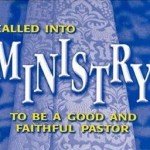Elders/Pastors and Financial Benefits in 1 Timothy 5:18
In many sectors of the church, elders/pastors and financial benefits seem to go hand-in-hand. In fact, until a few years ago, I had never heard of a church that did not fall into one of the following categories: 1) already employed one or more people as elders/pastors, 2) actively looking for one or more people to employ as elders/pastors, or 3) could not afford to hire someone as elder/pastor but was working toward that goal.
In this series, I am examining three passages (in four posts) in which elders/pastors and financial benefits are explicitly connected. Those three passages are Acts 20:33-35, 1 Timothy 5:17-18, and 1 Peter 5:2. I think it is important to analyze each passage to determine what it can or cannot mean before synthesizing the information together to help us understand what Scripture says about the connection between elders/pastors and financial benefits.
In this post, I’m going to examine what Paul wrote to Timothy in 1 Timothy 5:18 regarding elders/pastors and financial benefits. (Yesterday’s post examined the preceding related verse 1 Timothy 5:17.)
Here is the verse under consideration along with the preceding verse:
Let the elders who rule well be considered worthy of double honor, especially those who labor in preaching and teaching. For the Scripture says, “You shall not muzzle an ox when it treads out the grain,” and, “The laborer deserves his wages.” (1 Timothy 5:17-18 ESV)
In my previous post concerning 1 Timothy 5:17, I concluded the following:
The people are only to consider elders worthy of double honor if they are already leading well and working hard in the word and teaching. There is no indication here that the people should provide “double honor” SO THAT elders lead well and work hard. So, the “double honor” in this passage is not similar to the modern concept of the salary. If anything, it is closer to the modern concept of the honorarium or “love offering.”
However, it is often brought out – correctly, I might say – that Paul uses the term “wages” in 1 Timothy 5:18, a term which probably does refer to something similar to the modern cay concept of salary. Does Paul’s use of the term “wages” indicate that Paul sees “double honor” as “salary”?
The argument is that Paul is equating “elders” with “laborers”, and he is also equating “double honor” with “wages/salary.” Thus, according to this interpretation, elders are laborers and should be paid their wages just as other laborers.
However, there is a problem with this interpretation. Mainly, it does not work with the first part of the verse. In order for this interpretation to work consistently, then Paul must also be equating “elders” with “ox,” and he must also be equating “double honor” with “grain.” However, no one argues that elders are oxen who should be given grain. Instead, it is recognized that this is a metaphor.
The metaphorical connection between “elders”/”double honor” and “oxen”/”grain” helps us understand how to interpret the connection between “elders”/”double honor” and “laborers”/”wages.” The connection is the concept of something being deserved.
Elders (who lead well) deserve double honor in the same way that oxen deserve to eat grain while threshing and in the same way that laborers deserve the wages they were promised. Thus, elders are not laborers just as elders are not oxen. And, double honor is not wages just as double honor is not grain. The metaphor is used to demonstrate that one things deserves something else.
So, 1 Timothy 5:18 does not connect “double honor” with wages. Again, “double honor” could indicate some type of financial benefit, but it is impossible to tell in that context (since the term is used in different ways in the same context – see my previous post on 1 Timothy 5:17). The use of the term “wages” in 1 Timothy 5:18 does not affect the meaning of the phrase “double honor.”
—————————————-
Elders/Pastors and Financial Benefits Series
Elders/Pastors and Financial Benefits in 1 Timothy 5:17
In many sectors of the church, elders/pastors and financial benefits seem to go hand-in-hand. In fact, until a few years ago, I had never heard of a church that did not fall into one of the following categories: 1) already employed one or more people as elders/pastors, 2) actively looking for one or more people to employ as elders/pastors, or 3) could not afford to hire someone as elder/pastor but was working toward that goal.
In this series, I am examining three passages (in four posts) in which elders/pastors and financial benefits are explicitly connected. Those three passages are Acts 20:33-35, 1 Timothy 5:17-18, and 1 Peter 5:2. I think it is important to analyze each passage to determine what it can or cannot mean before synthesizing the information together to help us understand what Scripture says about the connection between elders/pastors and financial benefits.
In this post, I’m going to examine what Paul wrote to Timothy in 1 Timothy 5:17 regarding elders/pastors and financial benefits. (Tomorrow’s post will examine the following related verse 1 Timothy 5:18.)
This passage is in the middle of a section regarding relationships between different followers of Jesus Christ, similar to – but a little different than – the common household relationships that Paul normally uses. The section begins in 1 Timothy 5:1 and ends in 1 Timothy 6:2 (although the 1 Timothy 6:3 continues by callings these “teachings that accord with godliness”).
Here is the specific passage in view:
Let the elders who rule well be considered worthy of double honor, especially those who labor in preaching and teaching. (1 Timothy 5:17 ESV)
1 Timothy 5:17 is not directed to elders. Instead, it is directed to those who are not elders. Those who are not elders are instructed to “consider [certain elders] worthy of double honor.” Which elders are to be considered worthy of “double honor”? Well, the primary designation is those “who lead well.” (“Rule” or “lead/guide” are possible translations. “Lead/guide” is probably a better translation than “rule” given Jesus’ statement about “ruling” in the Gospels.)
The following designation of “especially those who are working hard in the word (probably “gospel”) and teaching.” These are not separate groups of elders (i.e. “leading” and “teaching). Instead, it is more like that some who are leading are also proclaiming the gospel and teaching.
The question of financial benefits lies in our interpretation of the noun phrase “double honor.” Does “double honor” indicate some kind of financial benefit? To begin our analysis, we must recognize that the word for “honor” in this passage CAN indicate the assumption of some kind of financial benefit (as seen in the verb form in 1 Timothy 5:3). On the other hand, the term for “honor” can also be used in a way that CANNOT indicate the assumption of some kind of finances (as seen in 1 Timothy 6:1). Thus, in the same context, we find “honor” used in a way that could include some type of financial benefit and in a way that could not be financial. So, context is not a big help in this situation. So, the best we can say at this point is the “double honor” may indicate that people should consider elders who lead well to be worthy of respect and honor that could include some type of financial benefit.
However, notice that the “leading” and “working hard” on the part of the elders occur BEFORE they are considered worthy of double honor. The people are only to consider elders worthy of double honor if they are already leading well and working hard in the word and teaching. There is no indication here that the people should provide “double honor” SO THAT elders lead well and work hard. So, the “double honor” in this passage is not similar to the modern concept of the salary. If anything, it is closer to the modern concept of the honorarium or “love offering.”
In tomorrow post, I will examine the next verse – 1 Timothy 5:18 – to see if it indicates some additional type of financial benefit for people who are elders.
—————————————-
Elders/Pastors and Financial Benefits Series
That man is your pastor?
(Please don’t get tripped by the title of this post. This post is not about the use of titles like “pastor.” I don’t like titles either, but many among the church use them. And, in the post below, one of the people uses that title…)
Joe (JR) at “More than Cake” wrote an excellent post recently called “Paparazzi Pastors Leading a Celebrity Church.”
In his post, Joe tells the story of a man he met while manning a booth at a conference:
Tim turned to me, a captive audience at the booth, and proclaimed, “That man is my pastor.”
Tim’s “pastor” leads a popular church in Seattle and since I had recently moved from that area, I was interested to know if we had some friends in common, so I asked, “Oh, so you are from Seattle? What brings you to LA?”
Tim’s answer surprised me, “No,” he said, “I live here in LA.”
Now I was intrigued. How could Pastor X, be Tim’s pastor if he lived 1,200 miles away? So I asked, “Did you recently move here from Seattle?”
“No.” Tim replied, “my church meets in my house and we watch Pastor X’s sermon every week on DVD.”
Make sure you read the rest of Joe’s post. He makes some good observations about Tim and his relationship (or lack thereof) with “Pastor X.” He uses this story as a jumping off point to talk about “celebrity pastors.”
But, in reality, for many among the church in the West, the “pastor” is just as much of a stranger and just as much “out of reach” as a person speaking on a DVD.
If you do not know someone – or are not growing to know someone – and if you never see them in a context other than speaking in front of a group of people, then that person is not shepherding (pastoring) you, regardless of what title the person may take for himself or be given by others.
Elders/Pastors and Financial Benefits in Acts 20:33-35
In many sectors of the church, elders/pastors and financial benefits seem to go hand-in-hand. In fact, until a few years ago, I had never heard of a church that did not fall into one of the following categories: 1) already employed one or more people as elders/pastors, 2) actively looking for one or more people to employ as elders/pastors, or 3) could not afford to hire someone as elder/pastor but was working toward that goal.
In this series, I am examining three passages (in four posts) in which elders/pastors and financial benefits are explicitly connected. Those three passages are Acts 20:33-35, 1 Timothy 5:17-18, and 1 Peter 5:2. I think it is important to analyze each passage to determine what it can or cannot mean before synthesizing the information together to help us understand what Scripture says about the connection between elders/pastors and financial benefits.
In this post, I’m going to examine what Luke writes in Acts 20:33-35 regarding elders/pastors and financial benefits.
At this point in the Book of Acts, Paul is making his way back to Jerusalem. He arrived at Miletus, a port city near Ephesus. But, he did not have time to travel to Ephesus, so he sent a message to the elders from that city and asked them to meet him in Miletus. (Acts 20:15-17) He reminded them how he had lived among them while he was in the city of Ephesus. (Acts 20:18-27; see also Acts 19)
Next, Paul exhorted them in a way that is often understood as being normative for all elders of all times in all places:
Pay careful attention to yourselves and to all the flock, in which the Holy Spirit has made you overseers, to care for the church of God, which he obtained with his own blood. (Acts 20:28 ESV)
Paul warned them that dangers would arise from false teachers who would come in among the church. (Acts 20:29-32) This, then, leads to the passage of interest for this post:
I coveted no one’s silver or gold or apparel. You yourselves know that these hands ministered to my necessities and to those who were with me. In all things I have shown you that by working hard in this way we must help the weak and remember the words of the Lord Jesus, how he himself said, “It is more blessed to give than to receive.” (Acts 20:33-35 ESV)
At the beginning of this section, Paul clearly spells out that he is talking about working in a such a way as to provide for himself (and others). Obviously, he also expects the elders to do the work of shepherding and overseeing, since he commanded this kind of work earlier in Acts 20:28. So, here, Paul is talking about another kind of work, the kind of work that Paul calls “working with your hands” in other places (connected with the terms “these hands” in this passage).
This passage also includes the second command in Paul’s exhortation to the elders from Ephesus: “…by working hard in this way we must help…” or “it is necessary to help the weak by working hard in this manner.” “In this way/manner” points back to Paul’s own example of working with his hands to support himself and others. Paul commanded (it is necessary) the elders to work in the same way that he hand worked so that they could support themselves, their families, and others who are in need/weak. (Paul often combines the concepts of spiritual weakness with physical need, as it probably the case here.)
It is perhaps most interesting to me that it is in this context that Paul quotes Jesus (and Luke records it) as saying, “It is more blessed to give than to receive.” Paul is using that quotation to reinforce to the elders that they should work so that they can give to others (i.e., be a blessing to others).
According to Luke, Paul expected the elders to both work among the people by shepherding and overseeing, and he also expected them to work with their hands to support themselves and others. In this passage, there is no other indication of financial benefit from being an elder other than what the elder earns by working himself. This does not mean that other kinds of financial benefits were not available. Instead, it means that Paul expected them to work even if other financial benefits were present.
—————————————-
Elders/Pastors and Financial Benefits Series
Elders/Pastors and Financial Benefits: Introduction
In the church today, it seems that elders/pastors and money go hand-in-hand. I’ve written several blog posts and series related to financial benefits and church leaders, especially for those who are hired as pastors, elders, or other positions among the church. Personally, I do not believe that Scripture justifies paying someone a salary in order for them to be an elder/pastor. (For a summary of my view, see my post “Summary – Should elders/pastors be paid a salary?“)
In this series, I do not plan to rehash my argument concerning elders/pastors and salaries. (By the way, I will primarily use the term “elders” in this series. However, if your traditions uses “pastor” or “bishop” or “minister” or anything else, you can assume that I’m referring to those people also.)
Instead, I’m going to look through several passages of Scripture that connect elders and financial benefit. Interestingly, there are only a few passages of Scripture that mention elders at all. And, among those, only three discuss elders and finances together. I’m going to discuss those three passages in canonical order in four posts:
- Acts 20:33-35
- 1 Timothy 5:17
- 1 Timothy 5:18
- 1 Peter 5:2
Now, in reality, 1 Timothy 5:17 and 1 Timothy 5:18 go together. However, I will examine them separately, but bring the connection together in the post on 1 Timothy 5:18. Also, all of the passages are part of larger contexts, and, in each case, the larger context will help us understand what the author is saying.
I think that it is important that these three passages (Acts 20:33-35, 1 Timothy 5:17-18, and 1 Peter 5:2) were written by 3 different authors and were written to three different audiences. However, I think the teachings regarding elders and financing is quite consistent.
Finally, in a sixth post, I’m going to write a conclusion for this series that puts together everything that we find in those three passages. In the conclusion, I will explain my understanding of the connection between elders and financial benefits. As I said earlier and in other posts, I do not believe that a salary correctly explains this connection. But, I do believe there is a connection that explains what is consistently taught in Scripture (both in these passages and in others that are not directly related to elders).
Obviously, many Christians throughout history – including today – disagree with my conclusions. I understand that. However, I have found that many commentaries and studies agree with my analysis of the various passages, even if they do not synthesize the results in the same way that I do. I think some of these conclusions actually contradict the analysis of the various passages. I’m seeking consistency, even if it means that my conclusions disagree with what has been accepted practice in the church.
So, I welcome discussion, and I welcome disagreement. I ask, though, that in this series we keep our discussion to the passages at hand. It is only by studying (analyze) the individual passages and understanding what they can and/or cannot mean that we can begin to put together (synthesize) the passages into a consistent conclusion.
—————————————-
Elders/Pastors and Financial Benefits Series
Guest Blogger: Simple Church (TM)
Last year, I invited several people to write “guest blog posts” for this blog. There are several reasons for this: 1) To offer different perspectives. 2) To generate even more discussion and conversation between blogs. 3) To introduce other bloggers to my readers.
(While I may continue to invite people to write guest posts, I would be willing to publish *almost* any post related to the church. If you are interested in writing a guest blog post, please contact me at aknox[at]sebts[dot]com.)
Today’s post was written by Joe (JR) Miller. J.R. Miller is a former church planter and now professor living in San Diego, California with his wife and three sons. He is an author and avid blogger. You can reach him at either www.MoreThanCake.org or www.EmergingLife.org.
————————————
“Simple Church ™”
Inspired by my friend Alan’s post “Just Make Disciples ™“, I am convinced that church is meant to be simple. All the institutional stuff has really hurt our Faith. Here is my new motto:
Church–So Simple That Anyone Who Follows Me Can Do It!
Why do we hold men above Christ?
Seminary trained pastors set themselves up as experts by writing books that teach us all kind of pagan things about leadership and community when all we truly need is the Bible. I am so convinced that the Bible is ALL we need, that I am commissioning a team of writers with no seminary training and who have never lead anything to write a book that everyone should read. This team of experts (with names you are sure to recognize) well give everyone all they need to know about how not to be a leader and how to avoid training so you can start a Simple Church. Oh, and we will have a magazine too!!
Why do we need all those conferences for “professional” clergy?
Those conferences are corrupting the church and taking away the priesthood of all believers. To counter this spiritual-tragedy, I would like to invite everyone to a new conference starting next year. The conference will be titled, “No More Conferences“. We will feature worship bands (unprofessionally led of course) and lecturers who will teach us how sermons are bad because they feature just one guy talking with everyone in chairs facing forward. Our conference will be held in a theatre where everyone will have nice chairs facing the stage so they can enjoy our featured experts. Come to the conference and you will get trained by our totally uneducated and fully untrained experts on how to be a Simple Church leader.
Why do we make paid preaching/teaching the center of our faith?
I think it is terrible that we listen to sermons and download them and sell them when the Gospel should be free. If you want to learn more, check back tomorrow and I will have a recorded talk you can download for a small fee or you can always order the CD. The Apostle Paul never sold his letters to the church and next year I will also have a new copyrighted book out on Amazon that will tell you all about it for just $9.99. These teachings will explain how we are destroying the church by trusting preachers who sell stuff all the time. (BTW, since I am not a paid preacher, I am allowed by the New Testament to sell this stuff… besides, my motives are pure unlike those other guys.)
Why have we made it so difficult to be the Spirit-led Church?
Men have put themselves out as leaders and make us think that unless we read what they write, we cannot be a valid church. That is just not how God works. So I am announcing the launch of a new blog that will feature all my books and all my recorded messages from conferences and weekly posts. My site will teach you how not to follow after the teachings of men. Trust only the Holy Spirit and follow me.
Why do we follow denominations?
Simple church will be all about rejecting denominations and seeing everyone as our brother and sister in Christ. To help you figure out which churches are truly simple, and not heretical like those institutional ones, we will set up a network of Simple Churches. We will have memberships and everything and promote our approved network of churches from our website.
Why do we meet in big buildings?
Anyone who reads the New Testament, or church history, knows that aside from meeting in public buildings or in Synagogues or caves, the church only ever met in homes. If your church is meeting anywhere but a house, you are corrupting God’s simple church because the house is God’s designated place for church meetings. A house is the only place that does not restrict the moving of the Spirit and A house is the only place where people won’t get corrupted by all the bad stuff. (You will learn more about this at next years’ big conference)
Church is Simple and anyone can do it!! So keep reading. listening, conferencing, networking, meeting in homes and downloading my stuff and I will teach you all the things you need to know about how to keep church simple and avoid the institution.
Oh, and don’t forget, if you don’t read all my stuff and listen to all my messages and go to my conferences, you will never know what stuff is forbidden by the New Testament and you will never be free from all the institutional stuff that holds you back.
The flock of God that is among you…
I’ve made this statement before, and I’ll make it again here: church covenants are often used to divide the body of Christ. I believe that we are already convenanted with one another due to our mutual covenant with God through Jesus Christ, and we are already in fellowship with one another through the Holy Spirit who indwells all of God’s children. Therefore, church covenants and memberships are unnecessary, and as I said above, can be a hindrance, especially to the unity of the church.
But, some argue, church covenants and membership are necessary (and even assumed in Scripture) because elders are to oversee “the flock of God which is among you.”
This kind of statement is made twice in Scripture:
So I exhort the elders among you, as a fellow elder and a witness of the sufferings of Christ, as well as a partaker in the glory that is going to be revealed: shepherd the flock of God that is among you… (1 Peter 5:1-2 ESV)
[Paul to the elders of Ephesus] Pay careful attention to yourselves and to all the flock, in which the Holy Spirit has made you overseers, to care for the church of God, which he obtained with his own blood. (Acts 20:28 ESV)
(Note: An unfortunate translation in the KJV has perpetuated the idea of elders being “over” the church: “Take heed therefore unto yourselves, and to all the flock, over the which the Holy Ghost hath made you overseers..” While other translations have corrected the preposition “over,” the idea continues.)
For this post, I want to consider the idea of being “among” or “in” the church of God. Peter says that the elders are among the church and that the flock (the church) is among the elders. Paul says that the Holy Spirit has made the elders overseers among the church (or in the flock).
Most people recognize today that “church” points to a group of people – a collective, much like the English term “crowd.” Thus, to be “in the church” or “among the church” would be similar to be “in the crowd” or “among the crowd.” The idea is being part of God’s church – one of the people who make up his flock.
So, whatever group of people Peter and Paul have in mind, the elders and the people are “among” one another; there is no sense of hierarchy in these passages. (This helps us understand how to interpret the noun and/or verb translated “overseer” or “oversee,” since these words have range of meanings that includes the idea of caring for people.)
But, what group of people did Peter and Paul have in mind? Did they have in mind the kind of “local church” differentiation that we see today? In each case, Peter and Paul are talking about multiple elders but only a single church or flock.
The only designation is in the preposition “in” or “among” (it’s the same word translated two different ways). So, which “people of God” is each elder “among”? In the traditional understanding today, the elders are “among” those with whom they share church membership or with whom they have decided to sign a church covenant. However, those same elders are not considered to be “among” other believers if they do not share church covenant or membership.
In this traditional understanding, an elder would not be considered “among” a follower of Jesus Christ who lives next door, or who is a coworker, or who attends the same community group unless that person is also a member of the same “local church” as that elder. Thus, in this traditional understanding of elders, the elder would not be responsible for shepherding or caring for that other person, and in the same way, the other person would not be responsible for shepherding or caring for the elder either.
However, there is no sense of the word “among” in which that person would not be “among” the flock of God together with that elder. If God brings someone into our lives, we are automatically “among” the flock of God together. We do not – and so cannot – choose who is or who is not in the church with us. God makes that decision. Remember that Paul told the Corinthians that God arranges the members of the body, each one of them, as he chooses. (1 Corinthians 12:18)
Imagine how different the church would be – and how much unity and fellowship we would enjoy – if we actually treated one another as the church of God… that is, if we treated all followers of Jesus Christ that God brings into our lives as “our church”… or, as I prefer to call it, “the church.”
When leaders guide you off the path
My son, his girlfriend, and I were running on the roads in our neighborhood. There is one point where a new cul-de-sac comes very close to a middle school near our home. We stepped off the road and ran down a path through the woods to the parking lot of the school. We ran around the parking lot, then headed back to the path to our neighborhood.
But, it had gotten darker, and I missed the path. We ended up running through the woods for a few feet.
Last weekend, I went on a trail run with a few friends. Three of us (the old three) stayed together while some of the younger guys ran ahead. We were taking turns leading on the trails.
Suddenly, we found ourselves off the trail and running down a hill into the woods. We turned around and made our way back onto the trail and continued our run.
I offer these two examples to make this point: Occasionally, even when leaders have the best of intentions and even when they are doing the best they can, they will lead us off the path. We end up in a place where we are not supposed to be.
The problem is not in having leaders. Scripture speaks of leaders (some prefer the term guides, which is fine). We will have leaders, whether they are recognized as more permanent leaders or they are temporary leaders for a specific time or project. Whether a group is more or less organized, there will be leaders.
And, guess what? Those leaders will make mistakes. No one is perfect. Even when someone is attempting to follow God and helping others follow God, that person will make mistakes.
This leads me to a very important question: What do we do when we realize that a leader (or a group of leaders) has guided us off the path?
Obviously, there are several ways to answer this question, and I think the way that we approach the answer tells us alot about what we think about leaders among the church, the work and responsibility of the church as a whole, and the presence of God with his children.
So, what would you do if you realized that someone has led you off the path? What if this mistake did not affect only you, but others as well?
How would this mistake affect your attitude toward the person(s) leading you?
How would you expect the leader(s) to respond when others realize that they have led them off the path? How should they respond if they do not believe they have misled people?
Again, I think these are very important questions that are rarely considered among the church. However, I think the mistakes in leadership happen often, even among those who are godly and who are genuinely seeking to help others.
Replay: Examples and Models of Ministers
Four years ago, I wrote a post called “Examples and Models.” I’ve added the phrase “of Ministers” to the title here, because that was the original point of the article. What does the term “Minister” mean to you? If you see a special type of Christian, then this article may be for you. You see, that’s what I thought a few years ago when I knew that God was leading me toward something… more? But what? “Well,” everyone told me, “you have two choices: pastor or missionary.” In fact, there are as many ways to serve (minister) as there are followers of Jesus Christ. I think the church needs more and more examples and models of these different kinds of “ministers.”
——————————-
I love the latest post by a new blogger, Trey from “One Man’s Journey“. The title of the post is “Walk Away for the Love of Christ?” I love his honest reflection and life-changing questions. I also see in his questions many of the questions that I started asking myself a few years ago. Here is an excerpt from Trey’s excellent post:
As my family and I sunk into a financial pit of despair, I began to read much in the realm of finance, investing, financial planning, and biblical financial stewardship. I grew to love this and can see many ways in which the average Christian and also the average church misuses the resources provided by God. I began to see myself as doing this sort of consultation work to families, small businesses, churches, and parachurch ministries once I gained the proper training. But what about seminary? What about my calling? What will my family think?
As previously, most issues discussed here have not been settled in my mind completely. I have been reminded in my prayer times that God certainly does not need me. He has managed eternity just fine before me and will do so long after I become one of saints on high. Also, why do I need the spotlight of an official pastor-elder of a local congregation? Can I not teach and serve in other ways just an important to the kingdom?
Several years ago, I also had this “calling”. Looking back, I think that God was calling me to a more committed life of serving himself and others – he was calling me to full-time ministry, although I don’t think he was calling me to “full-time ministry”. At the time, though, I only saw two options: 1) become a vocational pastor, or 2) become a missionary.
Why did I only see these two options? Well, those were the only two options that I saw modelled. These were the only examples that I saw of what it meant to serve God full-time. So, I picked one – vocational pastor – and did what I was supposed to do: I went to seminary. But, as my family will tell you, I struggled with the idea of being a full-time vocational pastor from day one. I did not think that this accurately reflected what God wanted from me, but I did not have any other categories, models, or examples to compare to.
I knew what God wanted from me: he wanted me to serve him and serve others in everything that I said and everything that I did. But, this couldn’t happen if I worked a regular job, right? I mean, regular people are distracted by work and commuting and co-workers and business trips and office parties. But, God didn’t want me to be distracted by these “secular” things, so I needed to give all of that up, go to seminary, get hired by a church in order that I could concentrate on “spiritual” things.
As Trey expressed in his blog post, I thought that the real work of God was done by those people who prominently stood before me each Sunday morning, Sunday evening, Wednesday evening, etc. These were the people who knew God and what God wanted from me and others and how to teach the Bible and how to put on Bible studies and where to find the lost people and when to schedule the Children’s program.
A strange thing happened on the way though. As I was happily preparing myself for just this type of “spiritual” vocation, I took my professors seriously, and I read Scripture to find the answers to my questions. It began with recognizing that Scripture does not call the Sunday morning routine “worship”. I asked myself, “If that’s not worship, then what is worship?” Again, I turned to Scripture for answers. From those answers, I was forced to ask other questions and search for more answers.
In fact, the more I studied and read and asked questions, the more I realized that the type of “spotlight servants” which Trey mentions – and to which I was aspiring – was not described in Scripture at all. In fact, I would suggest that “spotlight servants” are antithetical to the teachings of Jesus, Paul, Peter – in fact, all the books of the New Testament. Instead, Jesus calls all believers to be servants – not “spotlight servants”, but servants.
And, slowly, I began to understand that “vocational pastors” may be necessary to carry out what we typically see associated with church today. However, when we examine church in Scripture, we see that “vocational pastors” seem out of place. Instead, we see people shepherding as they work, and discipling wherever they are, and teaching in any context, and caring and comforting wherever they find people who are hurting. We find leaders who lead by example, not from the spotlight. We find elders who are mature and wise and known, not hired for their education and speaking abilities. We find prophets and teachers and apostles who are willing to dialog instead of monologue. We find disciples who are constantly and consistently attempting to live for Christ with the help of other brothers and sisters. We find that there is no secular and sacred divide. Through the indwelling Spirit, all things become sacred – every place becomes a sanctuary – every believer becomes a priest and a temple.
In other words, God can use me as his full-time servant when I am selling cars, or writing code, or running a business, or seeing patients. I can pastor while I am teaching in a school or college, or taking care of the home, or packing boxes, or delivering mail, or selling clothes. I can meet with other believers as the church in a church building, or in a restaurant, or in a park, or in a home, or in a car, or in an office. God was calling me – and he is calling others – into full-time service, wherever we are and whatever we’re doing.
It is my desire to live the rest of my life as an example of following God and serving him full-time in whatever vocation he provides for me. I hope that the believers who come along after me will see my example as another option when God calls them also.
Replay: Submission is given, not taken
Three years ago, I wrote a post on the topic of leadership called “Submission is given, not taken.” The point of the post is simple: some things can only be given by others; those things cannot be taken from them. For example, think about love. Love can be given, but it can’t be forcibly taken by someone else. Submission is the same way. Some think that since instructions to submit to others is the same as an instruction to exercise authority. But, this is not true. Why? Because submission can only be offered freely. If it is required by someone else, then it is not submission.
————————————-
Submission is given, not taken
This post is part of a monthly synchroblog. The topic for November is “leadership”. At the bottom of this post you’ll find links to other posts about leadership.
Today is election day in the USA, and many Americans are thinking about leadership. In the church, Christians often think about leadership as well. In fact, as Hans Kung has stated, leadership defines the church to such an extent that, for many, ecclesiology is simply an exercise in hierarchiology.
Whenever we discuss church leadership, the question of submission arises. Who is supposed to submit to whom? How do those “above” get those “under” to submit to their decisions? I suggest that these questions demonstrate a flawed understanding of the leadership that Scriptures teaches the church.
Starting with Jesus, he said:
You know that the rulers of the Gentiles lord it over them, and their great ones exercise authority over them. It shall not be so among you. But whoever would be great among you must be your servant, and whoever would be first among you must be your slave, even as the Son of Man came not to be served but to serve, and to give his life as a ransom for many. (Matthew 20:25-28 ESV)
Thus, according to Jesus, leadership among Christians is to be radically different – not front and center – but among and under. Leaders who follow Jesus’ example are not in front of a group directing them, but among and under a group serving them. Jesus was not talking about “servant-leadership”, but “servants”.
However, the more important point for this post revolves around the idea of “submission”. According to Hebrews 13:17, we are to “Trust our leaders, and submit to them.” This passage, and others like it, are often used by leaders to force, encourage, persuade, even cajole people into acquiescing to the decisions made by the leaders. This practice demonstrates a misunderstanding of submissions.
Leaders cannot force people to submit to them. This is not submission, but subservience. Instead, submission can only be given.
We often take instructions given to others and apply them for ourselves. For example, husbands often feel it is there responsibility to force their wives (or at least remind them strongly) to submit. Yet, the instruction is for wives to submit, not for husbands to force their submission (which is not submission but subservience or enslavement). Instead, husbands are instructed to love their wives. What does a husband do if his wife does not submit? He loves her.
The same can be said of leaders. We are told to follow or submit to those who are leading us. In reality, our submission demonstrates who our leaders are. Leaders are never told to force or even try to persuade others to submit to them. What are leaders to do if others do not submit? Keep living as an example of a disciple of Jesus Christ. We cannot choose whether or not people submit; we can only choose to obey for ourselves.
To look at it another way, is someone a leader if no one is submitting? If someone chooses not to submit (or follow) then I am not their leader – it doesn’t matter what “position” I hold, or what they say about me being a leader.
When Jesus began to teach about leaders among Christians, he pointed his followers to the “Gentiles” and said, “It shall not be so among you.” Today, most leaders in the church model themselves after the prevailing Gentile cultures and norms. But, this is NOT the type of leadership that Jesus taught.
Its time for believers to start following servants, not those who place themselves in the front of the group because of position or education or knowledge. And, its time for leaders to stop trying to force people to submit (which is not submission), and instead simply live their lives as examples of Jesus Christ. We persuade people to follow Christ, not our decisions and our leadership and our vision.
Submission is something that can only be given; submission cannot be taken.










